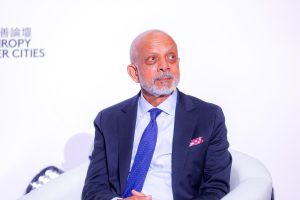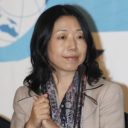The Rockefeller Foundation has a long history supporting the establishment of modern public health systems in Asia. Hence the presence of Naveen Rao, Senior Vice President of the foundation’s Health Initiative, at the Philanthropy for Better Cities Forum in Hong Kong. He was a speaker at a plenary that focused on global philanthropic collaboration to prevent and prepare for future public health crises.
Alliance’s East Asia Representative Fan Li had a chance to sit down with Rao for a quick interview during the forum. He spoke about the foundation’s next five-year strategy for its global pandemic prevention initiative, which will focus on the health effects of climate change. As Rao put it: “Health is the human face for climate change. Every climate change image you see, whatever it is, is eventually a health event.”
FL: Is this the first time you’ve come to The Hong Kong Jockey Club Charities Trust event?
NR: Yes.
FL: You were a speaker at a panel on post-pandemic preparedness this morning. Asia has often been at the sharp end of global health outbreaks. How do you see the importance of a gathering and discussion on greater philanthropic collaboration like this being held in Asia?
NR: It is really important for us to gather where the problem is hitting the hardest. And right now, the existential crisis we all face is climate change, affecting many people in this part of the world, whether it be heat, flooding, rising water levels, or ocean salinisation of the land. The irony is, the people who are suffering the most from this have contributed the least to cause the problem.
FL: That’s so true.
NR: So it’s very important for us to come to the place, talk to the people, understand what the problems are, and co-create the solutions with local communities, build trust, and that is why I think coming to Asia is so vital.
I do believe the new philanthropists and the new money are very welcome. They have the discipline to learn what the problem is, to co-create the solution and to enter into partnerships to make sure that the financing is there.
FL: The Rockefeller Foundation launched a US$150 million global pandemic prevention initiative in 2021. I know it’s only been less than two years, but can you share a little bit of what have been the focus areas, and have you already seen some positive outcomes?
NR: We have just refreshed our strategy. In fact I got approval from the board of directors of the foundation for a new five-year strategy to focus, again, on the health effects of climate change. We are specifically looking to see how we can set up systems to detect and prevent future pandemics. We do believe that because of climate change, both directly and indirectly, we are going to have more infectious diseases. And we believe communities need to be able to detect and predict these infectious diseases of pandemic potential.
What do I mean by detect and predict? For example, communities need to know what organism, what pathology, what bug is circulating in the community. But if you go to certain communities like informal settlements or slums, if you go to refugee camps, if you go to indigenous populations living far away in the forest, those people don’t come to the medical systems. By the time they get to the doctor, when a child is already sick, that is too late. So how can we detect what is happening in the community? One of the things that we at Rockefeller are doing on the detect side is we are trying to see whether we can scale up wastewater surveillance. Wastewater surveillance is a unique way of dip-sticking what is happening in the sewage from these information settlements or refugee camps to check if there is cholera, TB or malaria. So we’re trying to do those kind of things where we can detect what is already in the community, but that is not enough. We also want to know, what can we predict?
No one sector can do it by themselves, not the government, nor the philanthropy sector or the private sector. But if all three sectors come together, that is when solutions are possible.
Let me give you an example. Dengue is a mosquito-borne disease, and mosquitos don’t thrive in cold weather. So there were communities, say in Brazil, that were high-altitude, cold weather, and therefore that never knew dengue, that were protected from dengue because they were in cold climates. Those cold climates are warming now because of global warming. Mosquitos are now going there. Can we predict which communities are at risk? Can we map weather forecasting with social media and triangulate and see which communities are at risk for dengue and get the vaccine there ahead of time? It’s detect and predict infectious diseases that are climate change-exacerbated, that have potential for outbreaks and pandemics. That is where my focus is right now.
FL: The Rockefeller Foundation has a long history of supporting the establishment of modern public health systems in Asia, including Thailand’s first health ministry and the founding of the Peking Union Medical College in 1921. With the increasing wealth in Asia in the 21st century and rising number of next-generation philanthropists in the region, which approaches and experiences from that era do you believe continue to have significant value in your work today? What needs to be updated?
NR: What Rockefeller Foundation has learned over the last hundred years, and the new philanthropists are already picking up and leapfrogging over, is basically threefold: First, take the time and effort to go to communities and listen to what is their need, what is the problem, and what is the solution locally. Second, work with the communities to establish solutions that have measurable human impact. The third thing we have learned is to be able to get coalition of partners because in today’s problems, no one sector can do it by themselves, not the government, nor the philanthropy sector or the private sector. But if all three sectors come together, that is when solutions are possible.
I do believe the new philanthropists and the new money are very welcome. They have the discipline to learn what the problem is, to co-create the solution and to enter into partnerships to make sure that the financing is there. But the most important thing is to not just give money without thinking of sustainability and scalability. One image comes to mind from a past visit to a country: in front of the hospital, there is an ambulance with the hood open and they put flowers in the hood. So I asked, why is it used as a flower station? The ambulances were donated by some philanthropists. They donated three ambulances and there was lots of publicity at the time. But three years later, there’s no spark plug. Nobody thought of who’s going to repair the ambulance, who’s going to provide or put in the spark plug. So now it has become a flower pot. The lesson is that it’s not enough to give something, but how can you build solutions that are scalable and sustainable. I think the new younger generation of philanthropists are doing that, and a lot of them are from Asia.
FL: Hopefully they’re going to avoid the mistake of building elevators where there’s not a sufficient power supply.
NR: Perfect example.
FL: Will you be attending COP28 in Dubai this year, and if so what are you looking out for when you are there?
NR: What I’m really excited about COP28 is, after 27 years, this is the first COP where they will have a Health Day. I want to make sure we keep everyone’s focus on it because you may gain a lot, but everything will sink if you don’t have health. We’ve had 27 COPs, and everyone’s talking climate change, but this is the first time they’ve linked health and climate change. It took 27 years for people to realise that at the end of the day, health is the human face for climate change. Every climate change image you see, whatever it is, is eventually a health event. If it’s a flood, eventually there will be cholera. It is amazing to me that it took 27 years for the world to realise that if you don’t have health, you have nothing. That’s my story with COP.
FL: Thank you very much.
Fan Li is the East Asia Regional Representative at Alliance magazine





Comments (0)